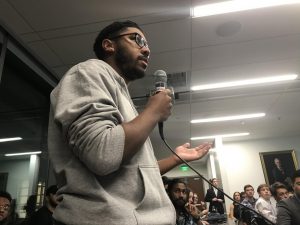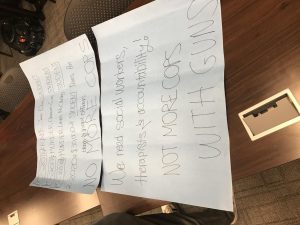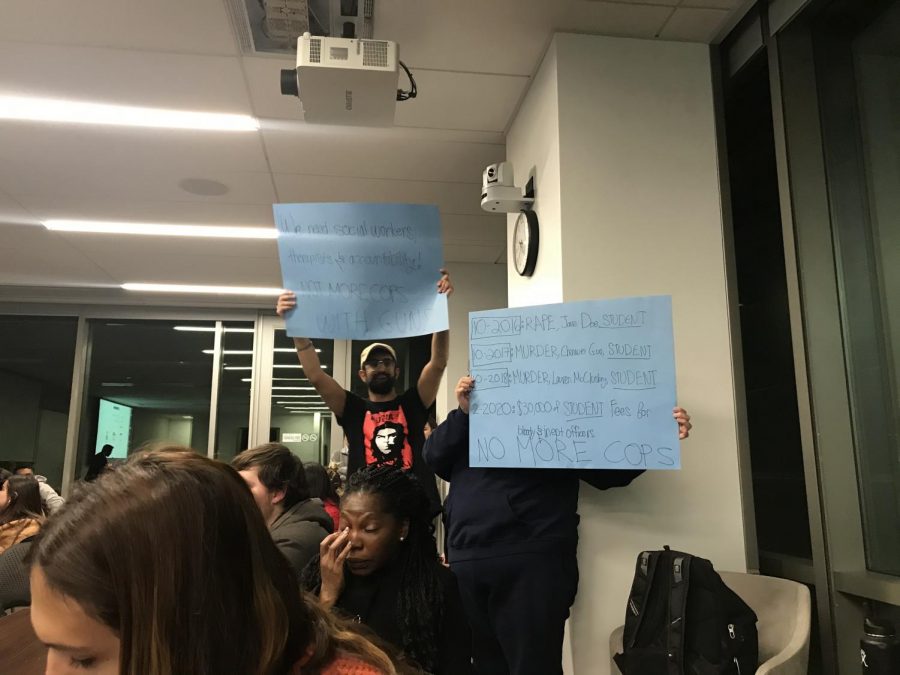Bill Expanding Campus Police Presence Unanimously Fails in the ASUU Senate After Student Opposition and Outcry
Students hold up signs saying “no more cops” at the hearing for Joint Bill 4. S.J. Quinney Law School, Feb. 27. (Photo by Natalie Colby | Daily Utah Chronicle)
February 28, 2020
A bill that proposed allocating space in the new University of Utah Union for the University Police Department unanimously failed in the Senate on Feb. 27 after over two hours of Senate discussion and student comments in opposition to the bill.
Gabriel Martinez, Vice President of Student Relations, wrote the bill and said he wanted to create a community between students and police officers on campus. The bill would have allocated funds from a senior gift to create the project.
“What this will accomplish is discussion involving how campus police can be integrated into the entirety of the campus community,” Martinez said. “It will foster collaboration among groups that have often not collaborated in the past. It will bridge a divide that is clearly seen in the campus.”
The bill passed 19-9 in the assembly on Feb. 25, where Police Chief Rodney Chatman was present. This prompted two Assembly members — Ermiya Fanaeian, the representative of Undergraduate Studies, and Hanin Sheikh, the representative of the College of Engineering — to resign. Fanaeian and Sheikh were opposed to the bill and felt that members of the assembly were purposely attempting to silence them as some of the only people of color present throughout the meeting.
Sheikh said after establishing and explaining her opposition to the bill, assembly representative Eric Reese said to her, “I get it, you hate cops.”
Fanaeian said many white assembly members told her that the issues presented did not happen to them and they don’t understand her frustration or fear.
“We understood if this body is not going to listen to us … Hanin and I immediately knew that this is a body we could not be apart of,” she said.
At the start of the senate meeting, senate chair Damon Ngo rescinded his sponsorship of the bill after hearing the students’ reaction to it.
“I don’t think I can represent this bill in good faith anymore,” Ngo said. “My job is to represent you, my job is to represent the campus community, my job is to represent my constituents and that’s what I feel like I need to do.”
Senators Rebecca Hardenbrook and Devon Cantwell agreed to co-sponsor the bill in order to hear students’ opinions, but emphasized they were against it.
Around 60 students attended the meeting and filled every chair in room 6500 of the S.J. Quinney Law School. Students even sat on the floor in order to protest the bill.

Senior Puneet Singh made signs that were held up all meeting reading, “We need more social workers, therapists, and accountability! No more cops with guns,” and another naming murders and rapes on campus over the past couple of years.
Martinez introduced the bill to the Senate and said he hoped to hold the police accountable and the university accountable, as well as representing the student community.
After a couple of questions from the Senate, the floor was opened up to public comments and questions.
Eight students asked questions, including Daniel Johnson. He questioned the need for a place in the Union when the university is allocating $13 million to a facility for the department of public safety. Michael Vetter, who studies mechanical engineering, asked about why they would approve the funding before seeing any data of support or guarantees about what the project would look like.
33 students then testified about their displeasure and anger at the bill.
Students emphasized their personal identities as members of marginalized communities, sexual assault survivors and representatives of student groups on campus. They said that having more cops would not help them feel safe.
Students graduating in 2020 expressed their anger this gift will be attached to their name.
Additionally, students expressed frustration they were never contacted about the bill. They said they never saw Martinez in their student organizations asking for input.
Many felt this bill would benefit only white, cisgender, heterosexual males and said they will feel unsafe in the Union with a police presence.
“The Union is a home on campus. It’s a safe space for marginalized across campus where hate speech and hate crimes run rampant. Increasing the presence of a racist bigoted institution functions is a big f— you to every marginalized student,” said Joy Kavapalue.

Ted Camper, a senior in information systems, explained that a lot of queer people don’t feel comfortable on campus.
“When we think about the police, we remember Stonewall,” he said.
Thandi Msiska, who is studying engineering and health society and policy, said while increased police presence may increase security for a significant population on campus, for students of color it means increased fear. As of 2018, 31% of undergraduates identify as people of color.
“This bill is a slap in the face to the efforts of our staff, faculty and fellow students who, by merely existing on this campus, fight for a more equitable campus every single day,” Msiska said.
Sadie Ortiz, a first-year studying business, said she was upset as a Mexican American that another Hispanic student failed to use their platform and speak out on issues that directly affected their community.
“I’m talking about you Gabe,” Ortiz said. “I’m embarrassed to know you have sold out.”
Senators read several letters from their constituents that reflected the opinions of the spoken testimonies and expressed their opposition to the bill.
Vice President of University Relations Latifa Yaquoobi said that both she and President Anna-Marie Barnes did not agree with the bill. She also said there was plenty of time to create a new student gift if this bill does not go through.
Besides Martinez, Attorney General Seodam Kwak was the only one who spoke in favor of the bill. He said they could either rebel or work together with the police. Students watching the discussion yelled “rebel” and “the first option.”
After hearing from the Senate and the students, Martinez said he was grateful for everyone voicing their opinions and while his intent may have been good, he did not feel like he took the best route to get there.
“Please forgive me for this. You deserve better and I will give you better,” he said, “I will propose a gift in the next legislative cycle that will be reflective of all the views of this university.”
At the conclusion of the meetings, every senator voted against Joint Bill 4, which met with cheers and a round of applause from the audience.









Devon Cantwell • Mar 6, 2020 at 2:37 pm
Hi Michael-
Thanks for mentioning this. I agree. I’ve reached out to the ASUU staff member to ask about recordings. I’m also submitting legislation that will mandate the live streaming of meetings, posting of legislation a least a week before the meeting, and posting of video/audio recording within 24 hours of the meeting. I’m also transcribing the student testimony in Senate and sending comments to the President, SVP for Student Affairs, Dean of Students, and Director of Student Leadership and Involvement.
Michael Vetter • Feb 28, 2020 at 4:56 pm
ASUU Assembly and Senate are supposed to make audio of each meeting available to the public. The Assembly Chair needs to release the record of the 2/25 meeting. The lack of transparency around such a consequential meeting presents a serious problem. The public expects Assembly representatives to be held accountable for their conduct during the 2/25 meeting.